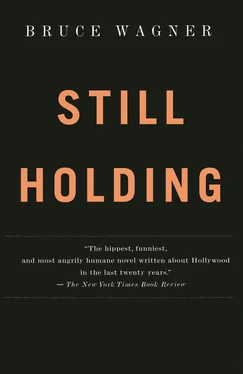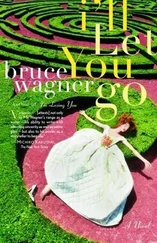And more than anything, she wished to learn the prayer called “The Power of Regret.”
Absent Without Leave
“YOU CAN GO ahead and see him now,” said the nurse.
Alf was in a special waiting area, away from the civilian hordes. Two cops were finishing paperwork in the corridor. The tallest approached with pad and pen; Alf instinctively knew what he was after.
“Mind if I get your John Hancock? My wife would never forgive me.”
“I’ll give you my Herbie Hancock too,” he said, taking the pen.
“Her name’s Roxanne.”
He signed: “To Roxanne (put on the red light!), All my love, Alf Lanier.”
• • •
THEY LED HIM to a curtained ER stall. Kit was sitting up. An unused, blood-speckled emesis basin rested in his lap. His hair was matted at the wound. His face looked pale and drained. The right eye was puffy, but he smiled reassuringly.
“How ya doin, Dog?” asked Alf, in the grimly serious tones of an intimate.
“I’m OK,” said Kit.
“Man, you scared the shit out of me.” Alf was relieved and excited at once. “The liquor store guy ran out screaming your name— I was like, What? I went and saw you lying there… it was very Bobby-Kennedy-at-the-Ambassador! I was, like, Where’s Sirhan Sirhan? ”
“What time is it?”
“Almost three.”
“This bullshit’s gonna be in the papers,” said Kit. “I better give Viv a shout or she’ll freak. Can I have your cell?”
“That mother fucker —it was the asshole who wanted us to sign his girlfriend’s tits.”
“They catch him?”
“I don’t know. The cops had me signing fuckin autographs, I was too busy to ask. They will. The liquor guy supposedly totally got his plates. He’s my hero, Dog.”
Alf handed him his phone. Kit swung a bare leg out from under the blanket. “It’s six o’clock in New York. Fuck it, I’ll call from home. Let’s go.”
“Whoa whoa whoa! What?”
“I’m outta here. I don’t like hospitals.”
“Did they say it was cool?”
“Frankly, Scarlett, I don’t give a shit.”
“ Whoa. Dog, you have to seriously chill. I mean, you start shooting in, like, a week, right? You should stay over so they can observe you.”
“Observe this. ”
“Just overnight, Dog—”
“You know what? This is the place where my mom died, OK? And you know what? Just do this with me, Alfalfa. I’ll be cool. Everything’s everything, Dog. Come stay at the house. Have a sleepover. You can observe me all you want.”
“Did you tell them you were splitting?”
“Yeah, because I have a splitting fucking headache.”
“Hey man, I’m serious. That guy didn’t just give you a little tap. Did they give you something for pain?”
“They don’t do that with a head injury.”
“They should give me something.”
“Viv’s got all kinds of shit. Beaucoup Vicodin from her root canal.” A pause, then: “So, you gonna stay over? Cause if you can’t, that’s cool too. I’ll be fine by myself.”
“Of course I’m gonna stay over. I just don’t think it’s one of the brightest ideas you’ve ever had. But whatever.”
“Thanks, Dog. Just don’t make a move on me while I’m sleeping.”
A Letter Home
BECCA WROTE a long letter to her mom.
She told how she met Spike Jonze because Sharon, a wonderful casting agent, had given him her audition tape and he’d been duly impressed. She enclosed a printout of his bio and credits from the Internet, in case Dixie didn’t know who he was (highlighting the part that said he was married to Sofia Coppola). She had planned to be on the conservative side and not reveal much more, but couldn’t help herself and wrote that Spike was in preparation for a film and that the writer Charles Kaufman, Mr. Jonze’s frequent collaborator (who of course had written Being John Malkovich, starring John Cusack and Cameron Diaz and Adaptation, starring Nicolas Cage and the venerable Meryl Streep), was quite possibly, if everything turned out right, going to create a small role tailored for yours truly. She was careful not to say anything about the new project actually being about look-alikes or bearing a look-alike “theme” because Dixie already knew about her daughter’s occasional private party and convention gigs where she was employed to be a Drew, and Becca didn’t want to give her the wrong idea or confuse her. She didn’t want her erroneously thinking that she was being considered for a part in any capacity less than that of a legit, featured player.
At first, she didn’t include anything about the new man in her life either. She did mention that Sadge was on the other side of the world editing a reality show and how that was probably not such a bad thing, “because between you, me, and the bedpost” they hadn’t been getting along all that well. But then she couldn’t help herself and, after inquiring as to the general health of her dad and brother, hinted that she was “kind of interested in someone” who also happened to be under simultaneous consideration for a role in the upcoming “Spike Jonze Untitled.” She added that “this person” was incredibly handsome and people thought he looked like Russell Crowe, whom she knew to be one of her mom’s faves.
She wrote these things down instead of saying them on the phone because it was easier that way to sort her thoughts. Whenever Becca called home, she thought she sounded like a flake. Dixie always wound up asking when was she coming back to Waynesboro — like her stint as a Hollywood failure was, in her mom’s use of the phrase, a “fate accomp.” Anyway, Becca was superstitious that the more contact she had with family, the less chance she would have at success, by her own lights. It was better, she surmised, to keep a healthy distance between oneself and one’s roots (not just geographical) — that, in order to grow, a person needed to allow a great big space for the mystery which was their birthright to shine through. Besides, by writing everything down she got a kind of overview of her life; it untangled her mind and gave her ballast. (She’d kept a journal as a girl, so it was second nature.) Putting pen to paper, she even got a funny sense of entitlement as an actress, though there was nothing really yet to show for her little boasts and efforts. At the end of the letter, she thought of mentioning the Dunsmores, because after all they were potential Hollywood players with whom she might find herself in production, but decided not to, feeling still somewhat tainted from the drug-fueled encounter at the Four Seasons. It mortified her to imagine her mother ever knowing such a thing had happened.
There would be plenty of time to call Dixie, down the line — and who knew? Maybe by then she’d have married a big wig or won a Golden Globe newcomer’s award or won a million dollars on a reality show (that, preferably, Sadge had nothing to do with). Maybe, God forbid, she’d get a weird settlement like the Dunsmores. Stranger things had happened… Maybe she and Rusty were on their way to being famous and she could go on the Leno show the way Brittany Murphy did, talking all sweet and humble, if that were possible, but Brittany pulled it off, about how before they broke up she and Ashton rented their first private jet so they could go back to Cedar Rapids, where Ashton is from, for Christmas, and then on to New Jersey to spend the rest of the holidays with Brittany’s family. (She wasn’t sure if the thing with Demi was trading up or trading down. But she knew it wouldn’t last.) Still, Becca made sure to say to herself that if she never did the Spike film, if it wasn’t in the cards, that would be OK too. She could always go back to Sharon. After the debacle, she sent the casting agent flowers and everything had been patched up (with promises of a “shiatsu date”). Sharon would get her auditions and meetings whether she scored the Spike gig or not. And if she didn’t, Becca theorized that, at the very worst, which really wasn’t that bad, it would be OK to be known as “the Drew girl” who almost worked with Spike Jonze. Sometimes that kind of reverse buzz was just what it took to launch a star heavenward. Elaine Jordache told her that for a long time Kevin Costner was known around town as the guy who got cut from a movie called The Big Chill. For a few years, the more he was edited out of projects, the more his stock kept rising. Those kinds of stories were legion.
Читать дальше












